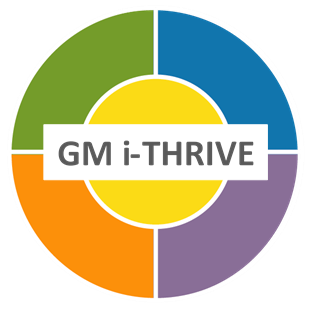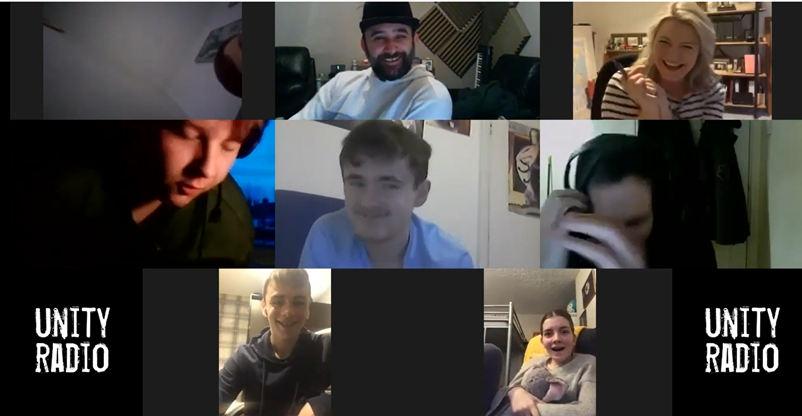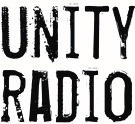
The Greater Manchester (GM) i-THRIVE Programme team spoke with Lee Dinsdale, Director at Unity Radio in Greater Manchester, to discuss the innovative ways in which their offer has been adapted during lockdown to continue supporting young people’s emotional health and wellbeing.
Download this implementation story.
Unity Radio online offer
Unity radio is a vehicle to both develop young people’s interests, by turning a hobby into a skill for life through working towards an accredited Arts Award; as well as presenting their own reflections in the form of positive debate in a peer to peer environment on key issues. The work of Unity Radio is aligned to a number of the THRIVE Framework needs based groupings. These are discussed in more detail here.
Workshop sessions provide training in radio skills as a diversionary vocational activity, interspersed with content designed to tackle underlying issues affecting young people’s emotional wellbeing. This focus on prevention and promotion aims to encourage reporting of incidents where relevant, providing victim support, and support on how to react in crisis situations.
Lee Dinsdale: Prior to COVID-19 we were due to start cohort 4 of the ‘I Believe’ project, a programme commissioned by Salford Clinical Commissioning Group (CCG), to deliver workshops for young people who are facing different challenges in their lives affecting their emotional wellbeing and mental health. These workshops, funded by Salford CCG, enable vulnerable young people in Salford to access statutory services such as child and adolescent mental health services (CAMHS), and to explore and present reflections on their own experiences through working with Unity Radio facilitators.
Due to the impact of COVID-19 at the time of recruitment for cohort 4, Unity Radio had to adjust to online only delivery. Recruitment and initial appointments with young people and parents shifted to remote working via ‘Zoom’, as well as all processing sessions taking place on this platform. Young people recruited to cohort 4 of the ‘I Believe’ project, continued to create and produce the online radio show from home, meeting three times a week to host the radio show and interview guests including the Deputy Mayor of Greater Manchester, Olympians, and NHS professionals. You can listen to these interviews here.
During online sessions, Unity Radio also introduced an Improvisation Teacher to support with ‘radio presenter skills’, to encourage confidence and self-esteem. You can watch this clip to find out more.
Figure 1: Unity Radio improvisation game

The Impact of Unity Radio
The move to an online service provision can be seen as an alternative way young people can access support for their emotional health and wellbeing. The online platform provided by Unity Radio offers young people a safe space, a feeling of belonging, a sense of identity and a platform to make new friends.
CAMHS colleagues’ testimony of working with Unity Radio:
“I spoke with a parent of a young person (YP) who is part of the Unity Radio project. This YP has a diagnosis of Autism Spectrum Condition (ASC) and suffers from low mood, anxiety and suicidal thoughts. Whilst they attended the face to face sessions, they struggled with anxiety but the move to online sessions enabled them to engage much better. Mum noticed that the YP’s mood lifted after participating and was able to share how much they enjoyed taking part and how participating in the project had given them something to look forward to in the future. Having future plans and hope for the future will ultimately be a part of shifting this YP’s mood and helping find an identity outside of their relationship with CAMHS. I would wholeheartedly support more online support from Unity Radio in the hope that it could reach out to other young people in a similar situation, particularly at a time where face to face support is being reduced elsewhere.”
Sample of feedback from young people attending Unity Radio:
‘It has been a good experience to meet new people and learn new skills’.
‘When I went to CAMHS they asked me if I wanted to get involved in a radio project and before I came to Unity, I wasn’t very social and I didn’t really speak to anyone. My confidence has grown and I speak to more people’.
You can listen more to how young people’s experience with the project here and here.
What have been the challenges of running online sessions with young people?
The biggest challenge has been competing with social media pulls and other activities young people would rather be engaging in whilst at home, as this is different from when young people come into our studios. Our facilitators are talented and have continued to work flexibly and adapt their delivery style to make sessions fun and engaging for young people. We have also had a huge range of guests coming onto the show which helps to engage young people.
At the beginning of delivering Zoom sessions, the majority of young people had their cameras turned off, however as the sessions proceeded and young people began to feel more comfortable and confident with the group they turned on their cameras. Young people commented on this being the result of engaging and having interesting interactions with facilitators and others.
How are you measuring outcomes of the sessions?
Unity Radio collects much of the same routine outcome measures (ROMs) as CAMH services, including the Revised Child Anxiety and Depression Scale (RCADS). We are working closely with partners to measure the real impact of our work on employability, A&E attendance, as well as reducing risky behaviours such as being missing from home and self-harming. The radio will continue to improve and adapt its paperwork, uploading them online for easier completion.
Lee: Due to being in lockdown we are not sure if the measures we are collecting are a true reflection of impact of involvement with Unity Radio, as there are other socio-political factors at play in people’s lives. Facilitators do gain verbal feedback from young people on how they are feeling and the impact Unity Radio sessions have on their day to day lives. We also continue to measure attendance rate session to session, which has remained high. Facilitators have been uploading outcome measures online and sending these to young people via email allowing for online completion. Young people are supported to complete outcome measures by group facilitators.
What is the future of the mental health and wellbeing offer at Unity Radio?
Lee: We have learned a lot about adapting our offer and engaging young people online, and will continue working with partners, building stronger alliances to support referral mechanisms between services. We want to try and reduce some of the anxiety that might result from joining a new and unfamiliar group. With future projects we are aiming for facilitators to have initial one to one meetings with young people prior to the group starting to help socialise them to using their camera, tell them more about the project and build a relationship with the facilitator before joining a bigger group which can often be daunting.
As well as continuing to measure the impact of Unity Radio on individuals, we would like to gain an understanding of the impact our work has on families as a whole. We know that supporting and meeting children and young people’s needs will positively affect the whole family, including things such as the cost of taking time off work, and the impact on sibling and parental emotional wellbeing. We believe that Unity Radio has massive potential to contribute to the health, education and social outcomes for local young people and their families.
If you would like further information, please contact Lee Dinsdale at leedinsdale@unityradio.co.uk.
Unity Radio: http://www.unityradio.fm/


Edited by the Greater Manchester i-THRIVE Programme team and the National i-THRIVE Programme team.
Written March 2021.